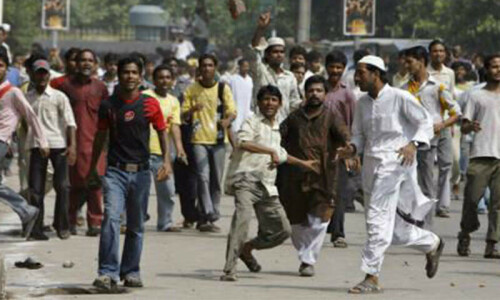KARACHI: The location of more than 60 per cent schools in the city is improper, which makes their students and teachers highly vulnerable to road accidents, said an expert on Saturday at the inaugural session of the fourth national conference on space, science and technology held in the arts auditorium of Karachi University. The conference was organised by the KU’s Institute of Space and Planetary Astrophysics (Ispa).
Giving a presentation on the findings of a study conducted at the university’s geography department, Dr Salman Zubair said poorly planned infrastructures were a risk factor for road traffic injuries and accidents and it was important to take the help of scientific methods, for instance the geographic information system, before constructing any civic structures.
“Children enrolled at schools that are established near or on busy roads were found to be at high risk to suffer road injuries or accidents. It is, therefore, suggested to incorporate road safety measures and GIS techniques while making decisions especially for establishing schools to minimise accident risk,” he said.
Speaking about the climatic changes the city has been experiencing and its geography, Prof Jamil Hasan Kazmi, a senior teacher at the same department, said 51pc of Karachi was composed of hills and, therefore, two-thirds of the city were still inhabited.
The city’s temperature, he pointed out, had gone up and variation in temperature was quite evident when one travelled from Malir to Defence and Clifton. A high number of concrete structures, he said, had turned Karachi into an ‘urban heat island’.
One of the factors which contributed to last year’s devastating heatstroke was the inefficient use of building material in high-rise constructions, he added
Sharing findings of their research, experts from the Punjab University and the Institute of Space and Technology, Islamabad, noted that modern style of living coupled with urbanisation, increasing waste from industries and faulty sewerage had marred the quality of drinking water and polluted water bodies.
Badar Munir Khan Ghauri of the Institute of Space Technology Karachi presented his paper on climate change and droughts in Pakistan. Continuing changes in the climate, he said, were having a serious impact on the country, its economy and its people, especially those who lived in poverty.
“Satellite data can significantly contribute to monitoring drought. It has been noticed that dry weather moved towards northeast from southwest of Sindh over the last few decades,” he said.
Experts from Ispa, including its director Dr M. Javed Iqbal, said that galactic surveys provided some of the most important clues in understanding dark energy, especially in combination with cosmic microwave background surveys.
Earlier, Sindh transport minister Syed Nasir Hussain commended the university for holding the event and said space technology had brought about major changes in the fields of defence, communication and even medicines.
“As you might be aware that Pakistan and China are jointly developing a special satellite to monitor the China-Pakistan Economic Corridor route while space technology is also being used to monitor road system and port management in our country,” he said.
Published in Dawn October 9th, 2016












































Dear visitor, the comments section is undergoing an overhaul and will return soon.